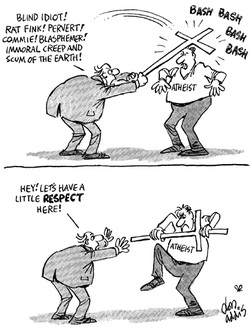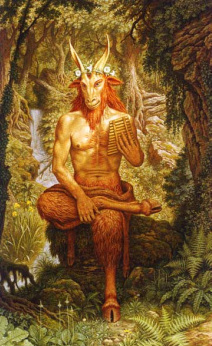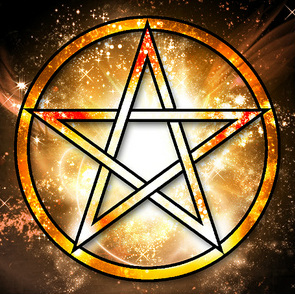One day at work you get called into the boss' office. "I'm sorry, but we're going to have to let you go. You are too much of a distraction in the work environment and upper management doesn't want you to give this business a bad image." You try calling your parents, thinking maybe they can give you some money or a job until you find a new one. But they don't answer. Its been years since they spoke to you, but you leave a message anyway. As you walk home a man jumps out of an alley at you. "You are what's wrong with this world," he says as he pulls a knife from his pocket.
All this could happen because you came out of the closet. So it's no surprise that people would keep their sexuality hidden. They are afraid of not being accepted by their family, their friends, or anyone that they may cross paths with. But it's unhealthy for them to keep their secret hidden from others, especially from those that they care about.
So how does coming out of the closet relate to Wicca? Being Pagan isn't too different from being homosexual; it's not mainstream, and that can lead to a lot of misinterpretation and discrimination. People don't understand what it means to be Pagan or gay, or they may simply hate Pagans or gays because they are different and are "outsiders." I've known both Pagans and gays who have been attacked or shunned because they are open about their respective religion or sexuality.
Which is why the phrase "coming out of the broom closet" has been used to describe someone who hasn't come out and openly said that they are Pagan (it combines the original phrase on sexuality with the witches-on-brooms idea). I myself am in the broom closet, although I have told a few people about being Wiccan. Just simply being "different" than everyone else is difficult; if you keep it secret then it'll burn inside of you until you tell someone, but if you are open about it then you need to be careful and prepare yourself for people's reaction and the stigma they've associated with what makes you "different." Unless you've gone through it before, you don't know what it's like.
 Image courtesy of Reddit WARNING: This post is me venting about how insensitive some people can be to Wicca and other religions in general. I may say things that are offensive to some, and I apologize beforehand. Read at your own risk.
Contrary to what some people may say, the United States of America is NOT a Christian nation. Most of its population is Christian, but that doesn't make it a Christian nation. While many of the founding fathers identified themselves as Christians (or Deists but that's a technicality), the First Amendment of the Constitution separates church from state, saying that "Congress shall make no law respecting an establishment of religion, or prohibiting the free exercise thereof..."
What does this mean? It means that everyone is free to practice their religion in peace. Let's not forget that the Puritans, some of the first people to colonize America, were Christians seeking religious freedom. I'm not saying all Christians are hypocrites, I'm just saying some people should take the log out of their own eye before they pick out the splinter in someone else's.
As someone who is hiding their religion from as many people as possible (including my family), I feel a little out of place when attending church and other Christian events. But that doesn't mean I won't respect others who are practicing their religion; I don't bother them, which is what I'd like them to do to me if they knew I was Wiccan. At times I've felt singled out, as if they've already judged me for being Wiccan. Sometimes my stomach flip-flops and I sweat a little, for fear that I'll lose all self-control and shout my secret in the middle of a sermon. It would be embarassing and send my family into an uproar if I did this, but I imagine it would be liberating to get that weight off my chest.
Just to clarify, I know that not all Christians are bad people; even though Christians throughout history have persecuted Pagans, I don't think a few bad apples should spoil the bunch. I just want non-Pagans to treat Pagans with the respect they deserve.
I'm sure that some of you may have trouble believing in magic. Magic is everywhere whether you admit it or not. All the students at Lebanon Valley College know that there are numerous ghost stories on campus, the most famous one being the Mary Green Ghost. Then there are those times when you see something out of the corner of your eye when there's nothing there. And the Ghost of Bloody Mary in a dark bathroom is an urban legend right? I don't know if it is but bear with me. To be more domestic about it, love is magical; I don't need to tell anyone who's been in love or felt loved how this feels. Life is magic.
I would like to say I know a bit about how other Pagan religions practice magic, but I don't. I only know how Wiccan magic can work. Wiccan spells usually orient themselves around the lunar calendar. For instance, a spell will be most potent during a full moon. There are two types of spells; deosil ones, which are constructive, or create something, and widdershin ones, which are destructive or get rid of something. An example of a deosil spell would do something like make you more attractive, while a widdershin spell would get rid of an illness. I'll go into more detail about deosil and widdershin spells when I do a more detailed post on spells.
There are multiple different skills Pagans can use to practice magic, or the Craft. They can specialize their skills with potions, divination, herbology, and charms. I know, it sounds a lot like Harry Potter, but that's probably the most well-known and most accurate presentation of magic in popular culture. Even within these different methods of practicing magic, there are a variety of specific skills. For instance, there are multiple forms of divination; tarot cards, rune-casting, water-gazing, palm-reading, and others. Usually a Pagan will focus on one maybe two fields, depending on what they are interested in and what their strengths are.
I should tell you that in my experience, I have not done any spellwork, but this doesn't mean that I haven't encountered magic. Like I said before, magic is everywhere. The trick is being able to recognize it. I have tried to perform astral projection, and I'm not exactly sure how successful it was. For those who don't know, astral projection is kind of like an out-of-body meditation experience; you go to a spirit realm (names vary depending on your beliefs) and can explore it freely. Usually this is done to gain magical or spiritual knowledge.
What questions do you have on magic? I can try to answer them, or maybe someone else can do a better job. I would ask you to describe your experiences with magic, but I know that some Pagans would take offense to simply being asked such a question. So if you want to share then do; I'd like to know, but I also don't want to offend anyone.
From my experience, many non-Pagans have certain misinterpretations about Wicca and Pagans in general. While other forms of Paganism may have their own stereotypes, I'll focus on Wicca in this post.
Myth #1: Wiccans are Witches
For the most part, this is true; but Wicca is different from Witchcraft (or simply the Craft). Witchcraft is the belief and practice of magic, while Wicca is a nature-based religion. While they complement each other very well, not all Wiccans practice magic, and not all practioners of the Craft are Wiccans. Some Christians and Atheists have been known to practice magic.
Think of Witchcraft like a methodology; a Christian can practice their faith through bible study and prayer, while a Wiccan can cast spells to praise the gods. Some people use the terms "Wicca" and "Witch" interchangibly, but know that some Wiccans will take offense to being called a witch, so I will use "Wicca" throughout this blog. Also, all the Wiccans and witches I've met aren't covered in warts, wear black pointy hats, or fly around on broomsticks.
Myth #2: Wiccans can Hurt People With Magic
I hate to say this, but this is true. Some spells can just make someone do bad on a test, while others can have someone break their leg. But don't panic and think that every Wiccan is out to get all the non-Pagans; the biggest rule of Wicca, sometimes known as the Wiccan Rede, is "Harm None, Do What You Will". Essentially, this means that Wiccans are generally peaceful people. Combined with the Karamic Rule of Three, or the Three-Fold Law, (paraphrased, it says that what comes around goes around threefold) Wiccans know that if they go out seeking to destroy and hurt that they would eventually receive a much worse treatment. Hence, in the rare cases where a Wiccan would cast a spell to hurt someone, it would only be an act of self-defense or to right a wrong.
Myth #3: Wiccans Run Around Naked and Have Unsafe Sex
False. While some Wiccans hold some ceremonies and rituals naked (known as being sunclad or skyclad), they don't go out in public naked like nudists. Even for those that occasionaly do go skyclad, they'll find an isolated place where they can practice their religion in peace. And while some Wiccans view sex as a celebration of life and fertility, they're not stupid about it; they'll parctice safe and private sex just like anyone else. Some Wiccans are increbibly bland in their sex lives; they'll have sex with one person at a time and only have sex in the privacy of their homes.
 Image courtesy of Google Myth #4: Wiccans are Devil Worshippers
Forgive me for a moment while I get on my soap-box, but this irritates me. This is false, and couldn't be farther from the truth. The idea of Satan is a strictly Christian idea, so for Wiccans to worhsip Satan doesn't make sense, since Wicca is a Pagan religion, not a Christian one. Also, the image of Satan was taken from the image of Pan (to the left), an ancient Greek Pagan god.
The reason for this is because the early Christian church wanted to antagonize Pagan gods, practices, and beliefs as much as possible while also adapting those beliefs to gain converts. Oddly enough, this is the reason for several Christian practices today; Pagans worshipped on Sunday like many Christians of today, and Yule, Ostara, and Samhain (Pagan holidays, or sabbats) correspond respectively with Christmas, Easter, and Halloween.
Also, the image of a pentagram (which you can see below) is not an image of the devil. It's Greek roots associated it with Pan, but modern-day Wiccans see it as a symbol of protection and magical enegy, and also represents the natural balance of the Five Elements (Fire, Air, Water, Earth, and Spirit). Even with its identification as a symbol of magic, it is rarely used in spells and rituals. Think of it like an icon for Wicca. Oddly enough, it was at one point used to symbolize the five wounds Christ received while he was on the Cross.
 Image courtesy of www.weebly.com Those are the myths that come to my mind at this moment. I hope you've learned a few things from this, and if you have any other misconceptions or myths about Wicca, please post in the comments. If enough people ask, I may even do a "Myths vs. Reality: Round Two" post.
I was born and raised in a Methodist household. As such, I would go to Sunday school and church every week. At first I was faithful and believed that Jesus died for our sins, that we should love our neighbor as ourselves, that God loved everyone unconditionally, and so on and so on. I’d feel good after going to
church; it was spiritually fulfilling.
I can’t remember when I lost my faith. It wasn’t at a single moment, but a slow, gradual process. I think I began to lose it when the lessons from the Bible began to get repetitive, when I was ten or eleven. At that age, religion was boring to me, and I only went to church because it was what my parents wanted. But I tried to make the best of it; I gradually began to memorize the messages and parables in the Bible.
As I got older, I developed more educated interpretations. I would relate the messages of parables and lessons I learned from church to books, movies, current events, and history. For instance, in Sunday school we looked at The Matrix movies from a Christian perspective, with Neo being a Christ-like figure.
But my knowledge was to compensate for my loss of faith; I didn’t have the passion and conviction that other Christians I knew had. Then in high school I learned about Taoism (or Daoism). It had an idea that blew my mind; the idea that the world is made up of opposites (think of a Yin-Yang symbol), and that for something to exist you need its antagonist as well. Basically, for there to be good there needs to be evil, for there to be man there needs to be woman, etc. It also emphasized the natural world, which to me was something that wasn't capitalized in my studies.
It wasn’t until college that I even heard of Wicca, and when I did, I thought it was strange. Wanting to know more, I did some research online, only to find that there was so much contradicting information that I quickly became frustrated and gave up. Later, a friend recommended that I read The Wiccan Rede by Mark Ventimilgia. I borrowed their copy and found that I agreed with many of the claims it made. I was converted. There was no ceremony or anything like that; it was simply a choice I made. The Wiccan Rede provided me with a good introduction into what Wicca is, and I recommend it to anyone who wants a general grasp of what Wicca entails.
|



 RSS Feed
RSS Feed